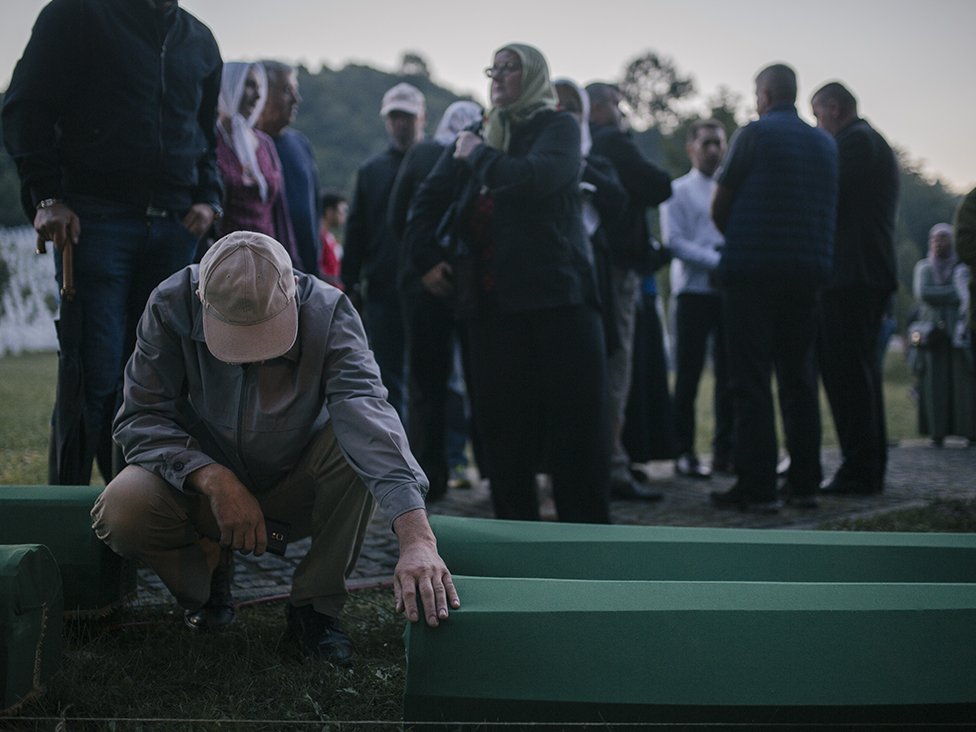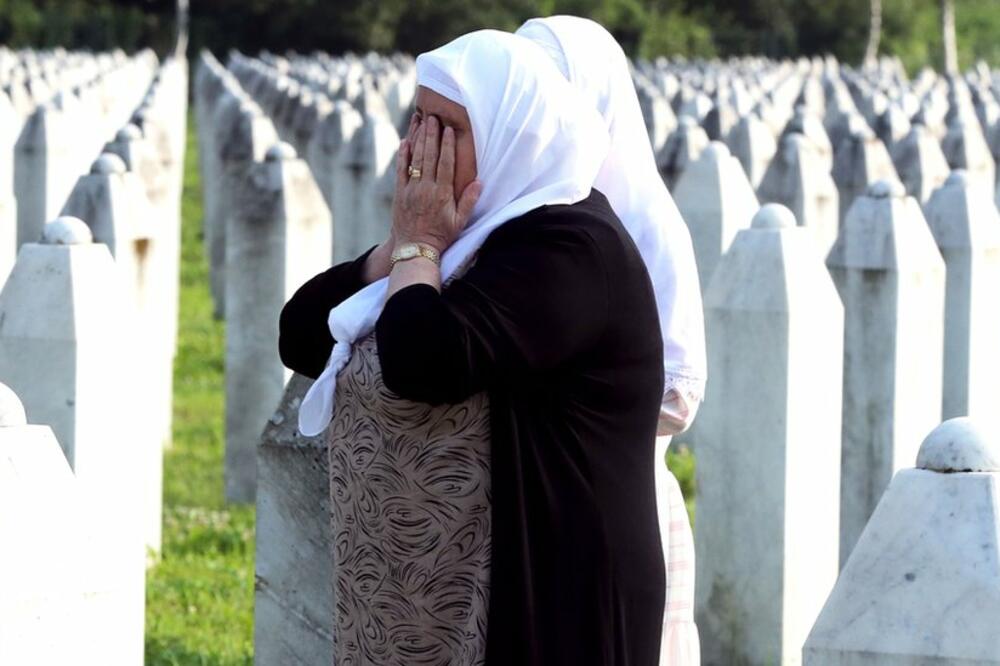There is no agreement on the genocide in Srebrenica from 1995 in the Balkans even almost three decades later, despite the final judgments of the International Criminal Tribunal for the former Yugoslavia in The Hague.
The new wave of discussions will be conducted thousands of kilometers away, at the headquarters of the United Nations in New York, where the General Assembly of this organization will discuss the draft resolution on the "International Day of Reflection and Remembrance of the Genocide in Srebrenica in 1995" in a closed meeting.
The text of the document was not officially published, and the vote on the resolution, proposed by Germany and Rwanda, a supported by Western powers such as America, Germany and France, but also Sloveniaand North Macedonia, is scheduled for May 2.
In July 1995, members of the Army of the Republika Srpska (VRS) killed more than 8.000 Bosniak men and boys in Srebrenica, a place in today's Republika Srpska, one of the two entities of Bosnia and Herzegovina (BiH).
Proceedings against 20 defendants were conducted before the International Criminal Tribunal for the former Yugoslavia in The Hague, and the first conviction for genocide in Europe after the Nazi trial was handed down in 2004 against Radislav Krstić, a former general of the Republika Srpska Army.
That was the first time that a court determined that genocide had been committed in Srebrenica.
To life sentences in prison, among other things, for the genocide in Srebrenica, Ratko Mladić was also convicted, former commander of the VRS, in 2017, as well as former president of Republika Srpska Radovan Karadžić, in March 2019.
- Srebrenica, when everyone turned their heads away from it
- Srebrenica - genocide, denial and discord
- Because of Srebrenica, four life sentences and 700 years in prison
- Genocide in Srebrenica through the eyes of children
While in Serbia and Republika Srpska, they strongly oppose the initiative to adopt the resolution, in Sarajevo they say that it will be an opportunity to continue the process of reconciliation in the region.
From the Memorial Center in Srebrenica they call her "on the occasion to finally end the daily politicization, denial of genocide and violation of the dignified memory of the victims".
Despite numerous discussions on the resolution, it will not have formal consequences, because "the UN General Assembly does not pass legally binding acts", says Mihajlo Vučić, a research associate at the Institute for International Politics and Economy in Belgrade, for the BBC in Serbian.
"These are more political declarations, and the consequence could be increased diplomatic pressure on the Republika Srpska and Serbia not to publicly challenge the decisions of the International Criminal Court in The Hague, as well as to change the criminal laws and in the future start to sanction this", assesses the international expert courts, arbitration and international criminal law.
Eric Gordy, a professor at the University College in London, also points to the factor of the current geopolitical situation, in which the "struggle for the definition of genocide" is taking place, he told the BBC in Serbian.
"Now the global narrative about genocide is changing due to the wars in Ukraine and Gaza.
"Until now, a narrow legal definition of genocide was used, set because of the cases of Rwanda and the former Yugoslavia, and at this moment the West may want to use a broader definition of genocide because of its relationship with Russia, just as the global South wants to apply such an attitude towards Israel," says Gordi.
What is known so far about the resolution?
Bujar Osmani, the Minister of Foreign Affairs of North Macedonia, said that the resolution declares July 11 as the International Day of Remembrance of the Genocide in Srebrenica and "unreservedly condemns any denial of genocide".
"All acts of glorification of those convicted of war crimes, crimes against humanity and genocide, including those responsible for the genocide in Srebrenica, are also condemned," he said. Ottomans, broadcast by television N1.
The importance of finding and identifying the remaining victims, of which there are more than 1.000, their dignified burial, was also emphasized, and the continuation of the process against the perpetrators of genocide was called for.
All countries are urged to fully fulfill their obligations in accordance with the UN Convention on the Prevention and Punishment of the Crime of Genocide in accordance with international customary law on the prevention and punishment of genocide, bearing in mind the relevant decisions of the International Court of Justice.
- "Srebrenica is one of the darkest pages of European history," says the EU on the anniversary of the genocide
- Trials for genocide and reconciliation - three stories: Myanmar, Yugoslavia and Rwanda
- Who is suing everyone for genocide in the Balkans
Voice of America, states that the proposal to introduce an International Day of Remembrance was modeled on the resolution of the UN General Assembly from 2004, establishing an International Day of Remembrance for the Rwandan Genocide.

Why is the resolution adopted by the General Assembly and not by the UN Security Council?
While the President of Serbia, Aleksandar Vučić, the resolution calls it "opening Pandora's box" for which Western powers are lobbying, the president of Republika Srpska Milorad Dodik announces that that entity could "leave decision-making in BiH" if it is adopted.
Denis Bećirović, Bosniak member of the BiH Presidency, stated is that the aim of the resolution is to "strengthen the process of trust and reconciliation", which he considers "very important for the future of the region".
Vučić criticizes the vote in the UN General Assembly, considering that the Security Council is the place to decide.
"It is an obligation that the Security Council deals with the BiH issue because it is still an unstable region, because there are still international forces and what they call a high representative," said the Serbian president.
However, the resolution on the genocide during the Rwandan civil war in 1994 is also adopted by the UN General Assembly in 2003., points out Mihajlo Vučić, an expert in international law.
"There is no reason why it should not be the same now, because the topic of the resolution belongs to the domain of culture of remembrance or political declaration, for which the Security Council is not an adequate institution," he says.
The Security Council "exclusively deals with the preservation of peace and security, passes legally binding acts and has mechanisms to forcefully implement them in practice, if states do not respect them," he explains.
Mihajlo Vučić compares the documents of the UN General Assembly with the resolutions of the European Parliament.
"These are related institutions, they have broad democratic legitimacy, because they represent all the members of the United Nations, that is, the European Union, but the states are not responsible for the violation of their acts", he points out.
Gordy reminds that he is the adoption of the resolution on the genocide in Srebrenica was attempted in 2015 through the Security Council, but was unsuccessful due to Russia's veto.
"That is why we are now going to the General Assembly, because there is no right of veto, and the resolution can be voted by a simple majority.
"In order for it to pass later in the Security Council, it must receive two-thirds support, which is not easy, given the divisions in the world," he believes.
Watch the video: What happened in Srebrenica
What is genocide?
It is defined as the deliberate and systematic destruction of a group of people because of their ethnic, national, religious or racial affiliation, according to encyclopedia Britannica website.
Rafael Lemkin, a Polish lawyer, was the first to use this term in 1944 to describe, among others, the crimes of the Nazis against the Jews during World War II.
United Nations of In 1946, they recognized the genocide as a type of crime, and two years later they adopted the Convention on the Prevention and Punishment of the Crime of Genocide, which was ratified by 153 countries of the world.
In addition to the verdicts against the Nazis for crimes against Jews and members of the RS Army for the mass murder of Muslims in Srebrenica, the International Criminal Court for Rwanda ruled that the Houthis, the majority ethnic group in that African country, carried out genocide against the minority Tutsi people during the 1994 civil war. .
See also this story:
Does the resolution change relations in the Balkans?
During the meeting with Vučić last week in Belgrade, Milorad Dodik again denied the genocide in Srebrenica.
He called the resolution an "invented form" whose goal is to "transfer collective responsibility to one people, the Serbian people, through individual judgments in The Hague".
Mihajlo Vučić believes that the resolution could be "a kind of warning to the authorities in the Republika Srpska for contesting the decisions of the central institutions of BiH and the high representative Kristijan Šmit, as well as secessionist statements".
He does not believe that the same message is sent to the Serbian authorities, because "Belgrade formally does not have an encouraging attitude towards such advances by the authorities in the RS".
"But the fact is that even the Criminal Code in Serbia does not recognize the denial of the genocide in Bosnia and Herzegovina as a criminal offense, so it is possible that the international community is trying to encourage Serbia to change that by means of a resolution," he adds.
The International Court of Justice in The Hague acquitted Serbia of direct responsibility for the genocide in Srebrenica in a 2007 ruling, although it was found that Serbia had not taken steps to prevent the genocide or punish the perpetrators.
In 2010, the Assembly of the Republic of Serbia adopted the Declaration on Srebrenica, which condemned this crime, which was not characterized as genocide, and Serbian officials still refuse to call it that.
Mihajlo Vučić believes that if the resolution contributes to the passing of a law in Serbia that considers denial of the genocide in Srebrenica a criminal offense, there could be a shift in relations in the Balkans.
"That would be a concrete step for Serbia, it would significantly improve relations with Sarajevo, which has been asking for this from Belgrade for a long time, which the international community also expects."
See also this story:
Follow us on Facebook, Twitter, Instagram, YouTube i Viber. If you have a topic proposal for us, contact us at bbcnasrpskom@bbc.co.uk
Bonus video:




